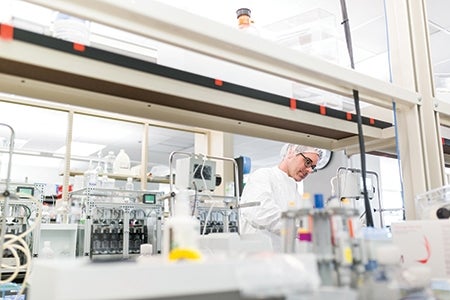Central Mass. cashes in on building bioscience
 An employee works at Moderna Therapeutics in Cambridge. Framingham-based architecture, engineering and construction firm DPS and its architectural partner TRIA are building a new clinical manufacturing facility in Norwood for Moderna.
An employee works at Moderna Therapeutics in Cambridge. Framingham-based architecture, engineering and construction firm DPS and its architectural partner TRIA are building a new clinical manufacturing facility in Norwood for Moderna.
It's no secret that the Massachusetts life sciences industry is booming. New labs and company expansions within the state are announced almost monthly, and 17 of the world's top 20 biopharmaceutical companies have a physical presence here. The biopharmaceutical industry employed 63,025 people in 2015, who earned a collective $9.3 billion statewide.
But the ripple effects of the life science boom can be felt across other industries, including in construction. Since 2007, more than 9 million square feet of laboratory space has been added in Massachusetts, and 4 million of that alone has come online since 2013, according to the Massachusetts Biotechnology Council (MassBio). Today, some multi-specialty construction firms have come to rely on the life sciences market as a steady source of business when other markets might fluctuate, construction officials said.
“This type of market sustains the construction industry in Massachusetts, because there's always funding, always research, and there always seems to be work in the sector,” said Robert Petrucelli, president and CEO of the Associated General Contractors of Massachusetts.
Several Worcester County and MetroWest construction firms, including some focused entirely on life sciences and some multi-specialty companies, said they have ramped up staffing and focused heavily on professional development to keep up with demand from the always-evolving life sciences sector.
“It's a very consistent industry in the part of the country that we live in,” said Brian Hamilton, project executive at Milford-based Consigli Construction Co., Inc. “It's constantly evolving.”
Development boom aided by the state
Elizabeth Steele, director of economic development and global affairs at MassBio, said construction for the life sciences industry continues to grow, as the industry grows statewide.
The Massachusetts Life Sciences Center, a statewide industry organization, has tax incentives that can help companies expand their physical footprint. In its 2016 fiscal year, the MLSC's Job Creation Tax Incentive Program alone awarded more than $20 million in tax incentives to 28 companies that pledged to create 1,395 new jobs by the end of the year.
At Gilbane Building Co., a Providence construction and real estate development firm with an office in Boston's Seaport District and nationwide operations, life sciences accounts for about 10 percent of total business, or about $500 million a year for the $5 billion firm, said James Busam, the firm's vice president and head of the national client team. Gilbane's portfolio includes projects at Worcester Polytechnic Institute and Worcester North High School.
Right now, the state's life sciences boom has kept business pretty consistent in that sector at Gilbane. Since many factors, including government regulations and health care, all impact the life sciences industry, it's prone to fluctuations, and that's why Gilbane has its hands in several sectors, Busam said. But at the same time, life sciences has held steady at 10 percent of business over the past two to three years, and Busam said he expects it will stay there for awhile.
Staying sharp
One of the challenges of constructing for the life sciences industry is making sure your workforce is up to speed on the latest needs or the newest technologies. Gilbane, which has 2,500 employees nationwide, is able to bring in staff from other offices to get the job done when necessary, Busam said. But the firm also recruits from schools like WPI.
“When you have that many employees, you find the ones with the right experience and assign them,” he said. “We have redeployed staff that had that expertise from different parts of the country and put them to work here.”
To stay sharp, employees at Milford-based Consigli have Consigli Construction University, where professional development trainings are usually held twice a week in a state-of-the-art meeting space right at headquarters. But workers also receive training through the Biomanufacturing Education and Training Center at Worcester Polytechnic Institute, where they take classes specific to advancing themselves as workers in life sciences construction. They also send employees to conferences and seminars.
Hamilton, from Consigli, said this enhances how employees approach their projects.
“You've got to understand why you're building something. You're not just installing pipes and drywall, but it's about how you're using it,” said Hamilton. “That makes a much better team member.”
Life sciences makes up for between 20 and 30 percent of Consigli's business, and that can fluctuate based on how life sciences itself is doing and on the behavior of the firm's other sectors. Right now, it's seen as a stable industry, and it has been a major driving force behind the company's growth.
Consigli has had to increase its workforce by 10 percent every year for at least the past four years, largely driven by hiring in life sciences.
Spotlight on Worcester
While demand for research and development facilities is still growing, there has been a recent surge in biomanufacturing, said Steele. In fact, biomanufacturing is growing at the highest rate of any subsector MassBio tracks, she said.
Central Massachusetts has been at the center of the biomanufacturing buzz. Bristol-Meyers Squibb's $750-million biologics facility is now up and running in Devens, and the Worcester Business Development Corp. in September was announced as the developer for a potential new 44-acre biomanufacturing site in Worcester, a site that may soon get its first tenant in California-based LakePharma. And in its annual report, the MLSC singled out Worcester for its “unmatched positioning” to become a biomanufacturing leader.
Busam, from Gilbane, said companies who perform their research and development in places like Cambridge have historically put their manufacturing operations in cheaper areas, such as North Carolina's Research Triangle Park. But companies are realizing the advantages of having them closer to each other.
“A lot of biotechnology companies have come to realize it is better to be closer to the science. The economic benefits of being closer to science outweigh the tax advantages,” he said. “There's been a bit of a boom in pharmaceutical manufacturing in Massachusetts, which is kind of an anomaly.”
At DPS, an Ireland-based architecture, engineering and construction firm with an office in Framingham, senior vice president Aidan O'Dwyer said he has noticed the biomanufacturing spike. His firm, with its U.S. architectural partner TRIA, is building a $110-million clinical manufacturing facility for Moderna Therapeutics in Norwood.
When DPS first came to Massachusetts in 2011, it acquired a small firm with 10 employees and worked in architectural engineering design. Today, the firm employs 140 at its Framingham office and offers commission and qualification and construction management services – all in the life sciences industry.













0 Comments